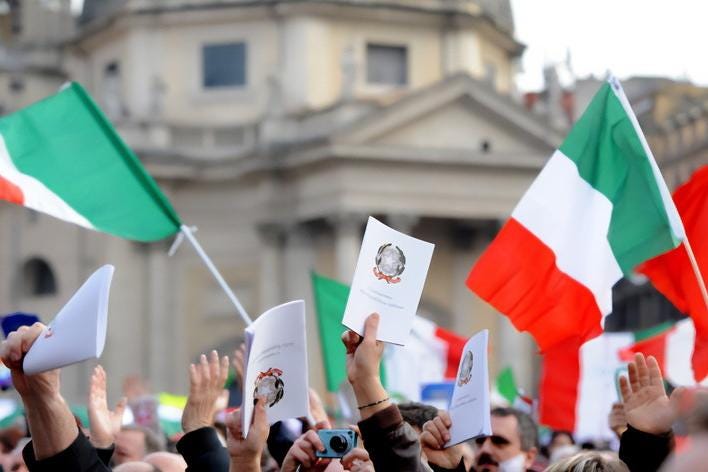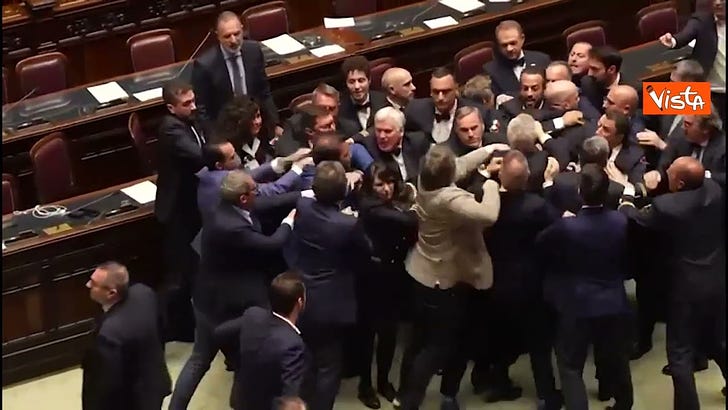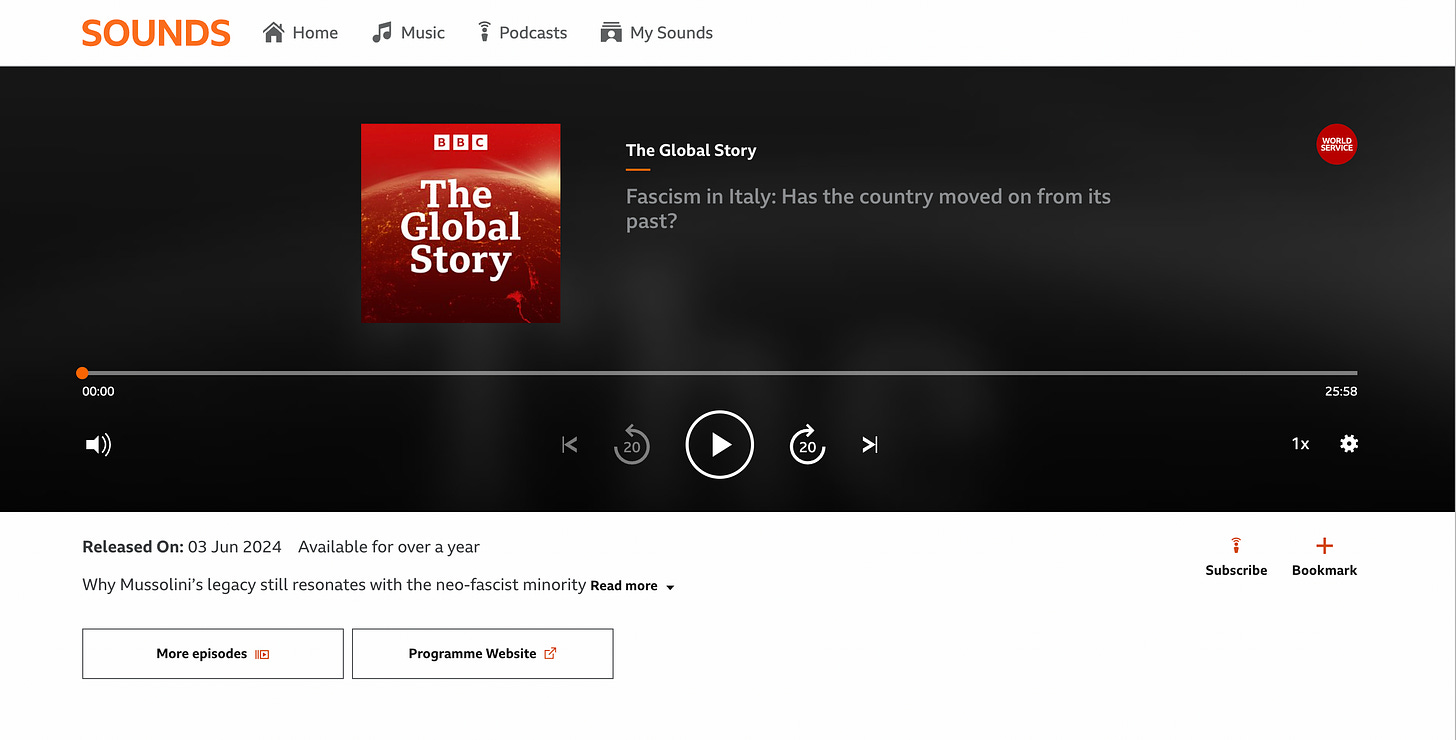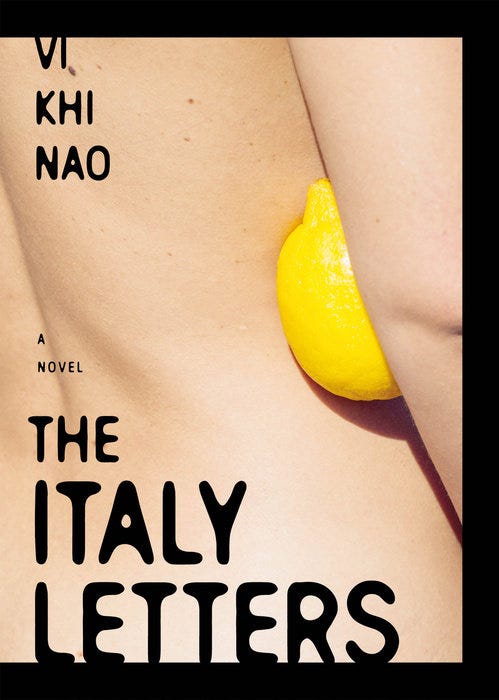For those of you that haven’t yet seen the news: last week violence broke out in the Italian parliament during a debate about the so-called autonomia differenziata, a government measure which is set to limit the authority of some regional authorities; particularly in the south. The end result — to radically simplify — is that more powers will be centralized at national level and the mezzogiorno will soon have far less fiscal control over public spending. As you might expect, many residents in Palermo, Naples, Bari and elsewhere have been protesting the proposal. The Five Star Movement (M5S) in particular, has been leading the opposition. All of which sets the scene: on 13 June Leonardo Donno, an M5S parliamentarian, brandished an Italian tricolore flag in the chamber as he accused the government of neglecting its very own self-stated nationalist agenda. The act was performative, theatrical; a little crude perhaps, but all within the parameters of legitimate debate. The response? Well, as you can see from the video below, was brutal. A dozen or so deputies from Fratelli d’Italia and the Lega swarmed Donno, pummelled him in the middle of the chamber, forcing him, briefly, to his knees. He was then escorted out in a wheelchair and treated for bruises at a nearby hospital. In a just society, this would be considered a crime. In Italy, it seems the assailants will get off with a slap on the wrist. Meloni has offered no condemnation of the events and none of the protagonists has yet been banned from the parliament. What else to say? These events are a disgusting reflection of the state of Italian democracy today, and the ethics of this government in particular. Watch the below, and be appalled.
That’s not all, I’m afraid. This Tuesday, a week after the scuffles in the Camera, the Italian Senate approved a more substantive and potentially dangerous reform package which aims to overturn the current post war constitutional arrangement by empowering the people to directly nominate the Prime Minister (and not the parties as in the current system.) The new bill would see voters elect PMs for five-year terms — and the coalition with the winning candidate would be given at least 55% of seats automatically in both chambers to ensure political stability. This might — at first — sound like a good idea. After all, such a move would bring citizens closer to power right? Well, perhaps. In a perfect world. On the other hand, as critics have pointed out, the current constitution does, for all its flaws, protect the parliament from charismatic authoritarian leaders who would strive to undermine the rule of law. Meloni insists her reform is “not about her” but about the country’s future. Coming from a leader who called on her supporters to “WRITE GIORGIA” on their EU election ballots, however, it’s hard not to see this move as part of a concerted effort to cut back on checks and balances that were put in place in the years after the war for good reason — to prevent the return of fascist-style leaders.

Speaking of fascism, the BBC published a short audio report the other day on the ongoing nostalgia that some Italians still seem to feel towards Mussolini and the years of the regime. This is hardly news. Actually, the issue is as old as time, and it’s been a constant problem since the immediate aftermath of WWII. In this 20 minute radio segment, a roundtable of journalists talk about the significance of the ‘Roman salute’ today, the normalisation of pro-Mussolini merchandise and the return of, or rather persistence of, black shirt style thuggery. These are all interesting and important topics, I know, but I have to say I do get a bit uneasy when international commentators focus so disproportionately on bonkers fringe groups like CasaPound; there’s a kind of drooling fascination with the cosplay parts of the far-right which, if mishandled, risks being superficial and sensationalist. Thank goodness, then, for John Hooper of The Economist who here provides a rational and deeply-rooted account of how everyday conservatism, anti-politics and individualist pragmatism lie beneath so much fascist nostalgia. Listen at the link below.
Arts & Culture: Uno, Nessuno e (Cinque)centomila
If you’re still traumatised by the memory of your high school exams then you might want to skip this paragraph: otherwise you might be interested to reflect on the fact that this week 500,000 school pupils across Italy completed the so-called maturita’ exams (i.e. the equivalent of A-levels in the UK or Baccalauréat in France). In many countries this is a matter for the education sector alone. In Italy this is a media spectacle in its own right. 2024 was, apparently, “a hard year.” Students were made to navigate Giuseppe Ungaretti’s ‘Pellegrinaggio’ and Luigi Pirandello’s ‘Quaderni di Serafino Gubbio operatore’, offering their reflections, in effect, about the ‘postmodern fragmentation of identity’. Non-fiction texts included an extract from Giuseppe Galasso’s Storia d’Europa about the atomic bomb and an essay by Maurizio Caminito about the perils of social media. That’s not all, of course, (liceo classico students have had to do translations, liceo scientifico graduates are focused on maths etc) but I thought I’d draw attention to the literature component here specifically a) because the texts themselves seem such relatively sound choices this year and b) because the maturita’ is such a key part of any generation’s cultural formation. Check out the video below (recorded the night BEFORE the exams) for a snapshot of how crazy this occasion can be — and, on that note, good luck to all involved!
Alright, this next one is unashamedly niche and, I suppose, only tangentially related to Italy. Still, if you’re looking for books to read this summer during the August vacation then this is one for your list(s). The Vietnamese experimental fiction writer Vi Khi Nao has got a new book on the way called The Italy Letters which I am sure will appeal to many readers here. Hence this recommendation. The book is an epistolary novel, narrated by an unnamed woman who, we deduce, is sending letters to her lover in Italy in a strangely warped stream of consciousness style. I got an advance copy from a friend working in publishing and I have to say I was blown away. Khi Nao offers a brave and humane exploration of countless topics including queer identity, sex, illness, ageing, homesickness and class that explode far beyond the boundaries of auto-fiction. Not only that, she’s an impeccable prose stylist — and the writing is an aesthetic and formal triumph. The book’s not on general release until August but if you’re interested, do give this one a pre order to support a rising literary star of the indie fiction world. I got through the 190 pages in just a couple of hours but am for sure planning a re-read later this year.
Recipe of the week: Spaghetti [al crudo] with tomatoes, olives, capers and anchovies
It’s starting to get hot here. Too hot to cook frankly. I’m writing this post from Rome where at midday — when I arrived to Termini — the temperature was an astonishing 41 degrees celsius! It’s oppressive and clammy. A Saharan dust cloud is hanging in the air and everything is covered in a layer of sand. Eating in these conditions is an unappealing prospect I have to say. That’s why this week I’ll be prepping-up Giorgio Locatelli’s ‘spaghetti with tomatoes, olives, capers and anchovies’; aka spaghetti al crudo. The dish, which I learnt to make a few years back, is basically a variation on puttanesca only instead of frying the ingredients you leave them raw. The result is light and refreshing from the tomatoes and basil but pleasantly briny and salty from the jarred ingredients. Locatelli suggests warming the raw vegetables with a little pasta steam. I find the dish is actually better served ice-cold after a whole night marinading in the fridge, almost like a pasta salad — though of course that’s just a personal preference, and the choice is yours. Either way: here’s the link.
I’m Jamie Mackay, a UK-born, Italy-based writer, working at the interfaces of journalism, criticism, poetry, fiction, philosophy, travelogue and cultural-history. I set up ‘The Week in Italy’ to make a space to share a regular overview of the debates and dilemmas, innovations and crises that sometimes pass under the radar of our overcrowded news feeds, to explore politics, current affairs, books, arts and food. If you’re a regular reader, and you enjoy these updates, I hope you’ll consider becoming a supporter for EUR 5.00 per month. I like to think of it as a weekly catch-up chat over an espresso. Alternatively, if you’d like to send a one-off something, you can do so via PayPal using this link. Grazie!




